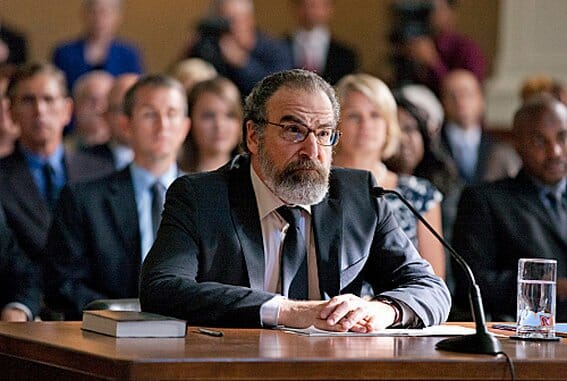Homeland: “Tin Man Is Down” (Episode 3.01)

Hello, everyone. My name is John Vilanova, and I’m very excited to be handling the recaps of Showtime’s Homeland this season. Feel free to let me know your thoughts in the comments section; I’ll try to respond to each of them via Facetime.
This week’s episode begins what could be called a second act for the show with the departure (for now) of marine-turned-traitor-turned-CIA asset-turned-(maybe)-traitor again Nicholas Brody (Damian Lewis). With the fires still burning at Langley from a bomb planted in Brody’s car, our intrepid heroine Carrie Mathison (Claire Danes) whisked him off to the Canadian border for a farewell to the relationship that gestated in Season 1 and bloomed in Season 2. The Danes and Lewis pairing, which netted Emmys for both after Season 1, was famously too compelling, if such a thing is possible.
Much has been said (and not said) about showrunners Alex Gansa and Howard Gordon’s plans for Brody, who strapped on a suicide vest at the end of Season 1 only to hold off on pulling the trigger. Many have suggested that his second thoughts were a concession to the show’s ratings breakout and the on-screen chemistry of Danes and Lewis. But whatever the case, as Carrie’s mentor Saul Berenson (Mandy Patinkin) reminded her (and us), Brody will always be the guy who put on that vest.
And thus Homeland’s Brody problem—how to reincorporate a character whose credibility had run its course but who needed to remain relevant—was often handled sloppily during the show’s second season, creating a disjointed set of episodes that never ascended to the heights of the show’s breakout debut. One of the hallmarks of the first season was its impeccable plotting—the strings moving these characters toward the finale grew tauter and tauter each week in a story that was as well-managed as it was dynamic. That continued throughout much of the second season’s first half, but as time wore on, there were too many moving parts as each week’s hour became spread more and more thinly.
The show’s relationships—Carrie and Brody; Brody and his wife, Jessica (Morena Baccarin); Brody and his daughter, Dana (Morgan Saylor); Carrie and Saul—created a skewed set of priorities that negatively impacted the Homeland team’s ability to tell the bigger story. Simply put, it’s just hard to care about Jessica being pissed at Brody for not answering her calls when there’s supposed to be a terror plot of that scale in the works.
The misdirection of Season 1 (the sniper-ready roof in view of Marine One’s landing spot) also seemed to give way to less relevant distraction (Dana and Finn’s hit-and-run) throughout much of last year. Two seasons ago, these twists and turns felt in service to the larger story and the “big question” of Brody’s allegiance. Last year, the waters were often too muddied and the question (still unanswered, for the record) mattered less and less. The show is built on putting the viewer in a place of not-knowing, but throughout much of last year, the evidence we were working with was simply too inconsistent to come to any conclusions at all.
The season’s liberties also gave rise to the Internet as a kind of plausibility police—calling foul on Brody and Abu Nazir’s Facetime talks, the CIA’s use of super-Skype for webcam chats and the remote overload of Vice President Walden’s pacemaker. While the creators’ America can be whatever they want it to be, these choices created an unevenness that undermined the season as it reached its conclusion.
That all being said, moments like Carrie and Brody’s hotel-room confrontation and the subsequent “Q&A” episode (arguably the series’ strongest hour) were still great television. Upon rewatching the season over the last few weeks to prepare for Season 3, there were still multiple nights where after finishing an episode, I felt the itch to keep going late into the night. If a show’s doing that—in spite of its imperfections—it’s still doing something right. Let’s hope Season 3 can remove the inconsistency of last year and get back on the right track.
We pick things up two months later, with the fallout from the explosion still crashing back down to earth around Langley. Last season ended with Carrie and Saul standing over 219 neatly bagged corpses; now the carnage of the world around them is on full view after America’s “second 9/11.”
Saul’s left holding the agency conch—as ranking officer, people now stand when he enters the room. Thankfully, he’s got a buddy, with F. Murray Abraham’s Dar Adal coming on in a more permanent role as his right wing, right-hand man. It almost went without saying after his brief introduction last season that Abraham wasn’t going to be confined to buses and breakfast joints, and his calculated ruthlessness is a fitting foil to Saul’s flip-flopping.
For the most part through its first two seasons, Homeland did a great job of asking the “big picture” CIA-related questions subtly rather than moralizing or beating audiences over the head with how complex it was trying to be. One of the first times we met Carrie, she was ordering surveillance of somewhat dubious legality on the Brody house. Our erstwhile Sergeant’s suicide tape—which was used by the terrorist group claiming responsibility for the bombing—explained that he’d turned against his country to get justice against unpunished war criminals who had ordered a drone strike that killed children.
-

-

-

-

-

-

-

-

-

-

-

-

-

-

-

-

-

-

-

-

-

-

-

-

-

-

-

-

-

-

-

-

-

-

-

-

-

-

-

-








































